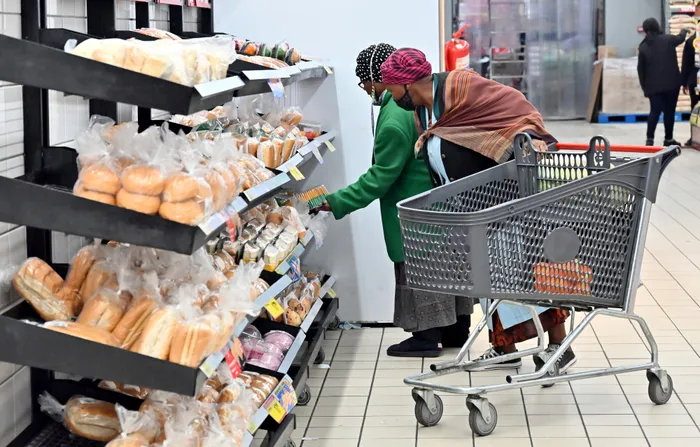Soaring food costs squeeze South Africans

The Pietermaritzburg Economic Justice and Dignity (PMBEJD) in its April 2025 Household Affordability Index showed that the price of a basic food basket increased by almost R100 month on month.
Image: Ayanda Ndamane/ Independent Newspapers.
WHILE the slight drop in fuel prices on Wednesday at midnight offered much-needed relief, many South Africans are still grappling with the still surging cost of living.
The price of both 95 and 93 unleaded has fallen by 22 cents per litre.
Diesel (0.05% sulphur) dropped by 42 cents a litre, and diesel (0.005% sulphur) has come down by 41 cents per litre.
However, for households already struggling with strained finances, the minor reduction was a drop hardly mitigated for rising food and utility costs.
According to the April 2025 Household Affordability Index, compiled by the Pietermaritzburg Economic Justice and Dignity Group (PMBEJD), the average cost of the "Household Food Basket" increased by R90.94 (1.7%), from R5 329.36 in March to R5 420.30 in April.
This spike in food prices continued to hurt the poor the most, all of which were spin offs from a sluggish economy and political instability.
In Durban, the Rise With Us Foundation, which provides weekly meals to the homeless, said it was battling to cope with the rising cost of food.
Wendy Maharaj, a representative from the foundation, said this hampered their operations.
“As things stand, we are struggling to provide food for the people who have no one to depend on but us. The cost of living not only affects us, but it also affects all South Africans. Our operations are funded by member contributions and occasional donations, but we’ve had to fork out over R8,000 recently just to keep going.”
Maharaj called on the government to regulate private retailers, warning that unchecked price increases could spiral out of control.
“If they continue to adjust prices as they wish, that will become a big problem to contain in the future. It is already a challenge.”
The foundation distributed food to various hotspots in Durban, including the vicinity of the Durban City Hall, where eThekwini Mayor Cyril Xaba and his executive were based.
Although the fuel price cut was a welcome development, it comes amid increasing frustration over high electricity and water rates in municipalities like eThekwini. Ish Prahladh, chairperson of the eThekwini Ratepayers and Residents Association (ERRA), said the petrol price decrease does little to ease the broader burden on residents.
“We pay high municipal rates, yet we don’t have a consistent water supply. The decrease in petrol prices does not fix the broken systems we have to deal with daily,” said Prahladh.
He added: “It’s hard for people to survive in these conditions, especially when the cost of living keeps climbing.”
South Africa's high unemployment rate, especially among young people, further worsened the situation. The ongoing debate around minimum wage has also reignited, as more families struggled to make ends meet.
Economist Dr. Ntokozo Nzimande from the University of Johannesburg said that while the fuel drop was a step in the right direction, its broader economic impact depends on whether it translates into reduced costs for essential goods.
“In theory, a drop in fuel prices should reduce the cost of transportation and food. “It also presents an opportunity for the South African Reserve Bank to consider more aggressive interest rate cuts to support economic recovery. But global uncertainties continue to pose inflationary risks, so our focus must be on stimulating growth.”
Mervyn Abrahams, programme coordinator at PMBEJD, said while the average food basket now stood at R5 420.30, year-on-year it has increased by R83.99 (1.6%).
“Out of the 44 foods we tracked in the basket, 24 increased in price in April while 20 decreased,” he said.
Key food items saw significant price hikes: tomatoes jumped 26%, carrots 20%, onions 11%, and oranges 18%. Other staples such as potatoes, spinach, cabbage, and beef also rose between 6% and 7%.
Even essentials like maize meal, full cream milk, and brown bread registered increases of 2% or more," he said.
Regional data painted a bleak picture. Durban’s food basket cost increased by R157.64 (3%) month-on-month, and by R168.23 (3.2%) year-on-year, reaching R5 425.23 in April. In Johannesburg, the basket rose by R77.58 (1.4%) from March, although it fell slightly year-on-year.
Evashnee Naidu, KwaZulu-Natal regional manager for Black Sash, told Business Report that while the lack of a VAT increase in 2025 was positive, it did little to offset the rising cost of food.
“South Africa continues to see food prices increase. We at Black Sash renew our call for permanent Basic Income Support to help vulnerable individuals and families,” she said.
WhatsApp your views on this story at 071 485 7995
DAILY NEWS